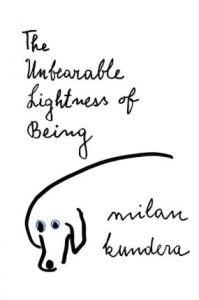I was interested to read this book, as a friend of mine from Uni is from the Czech Republic, and the novel is set in Czechoslovakia during the turbulent 1960s, so it allowed me to see something of her nation’s story as well as giving me an idea about where she is coming from on various issues. I had no preconceived notion about this work, so the book didn’t surpass or fall below expectations, but I was surprised just how much the book revolved around sex. Now, I don’t have an issue with this, but it would be nice to be warned when I’m reading it on a bus. I feel that people may be reading over my shoulder and think I’m reading something salacious. Anyway. I’ve read much worse since.
The way in which sex and love were presented through the thoughts and actions of the different characters was interesting and thought-provoking, with Tomas seeing it as nothing but another way of getting to know women better, and indeed being the only way to fully know their individual differences. This view can be understood somewhat in his profession as a surgeon, as this would precondition him to see people as the same, working in the same ways and as perhaps highly impersonal, whereas the act of sex allows him to see beyond the mechanics of the body into the personality of the individual. However, this view of sex and love as two distinct entities was something that seemed to run through the novel with all of the characters, and which begun to grate on me after a while. I can’t say that I condemned the characters for their actions and their views (that sounds a bit harsh), and indeed they were all likeable, believable figures, but I did see myself in moral and ideological opposition to them. For me, the two should be intimately intertwined, and so I was perhaps less able to empathise with the people in the novel than I have with other literary creations.
I did find the passages concerning the dog Karenin rather moving, though, which was a tad embarrassing on the bus, but Kundera did well to make Karenin as well-formed a character as the others in the text. Also, the sense of loneliness and desolation created worked well, and tinged much of the work with a quiet sadness that made it a poetic read in one respect. However, I think the biggest problem I had with the novel was that I missed the central philosophical tenets that underpinned the idea of ‘lightness’ and its opposition. Perhaps another read may be in order, in a quiet room with no distractions and a steaming mug of something rich. I feel that the book deserves a second chance, as I don’t think I’ve done it justice.





